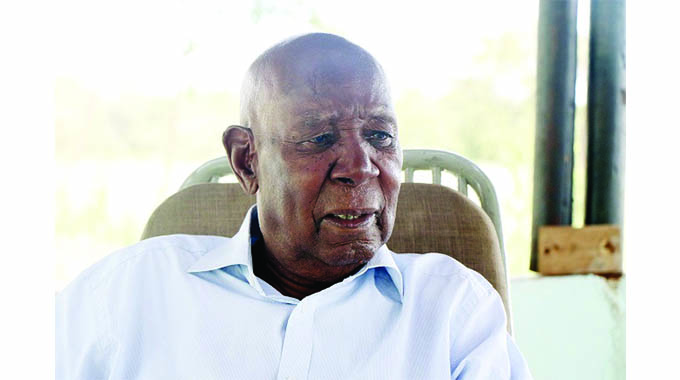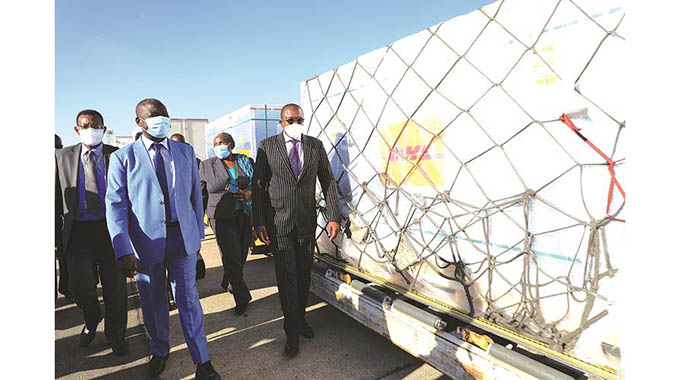Liberation stalwart Nkiwane declared national hero

Bulawayo Bureau
PRESIDENT Mnangagwa has mourned nationalist and liberation stalwart Cde Abraham Nkiwane — who has been declared a national hero — describing him as a fearless unflinching patriot who never hesitated to make personal sacrifices to liberate Zimbabwe.
Cde Nkiwane (93) succumbed to prostate cancer at Bulawayo United Hospitals (UBH) on Tuesday where he was admitted.
He was in the elite Zimbabwe People’s Revolutionary Army (Zipra) High Command.
Zanu PF secretary for administration Cde Obert Mpofu announced the national hero status to the Nkiwane family yesterday evening at their home in Umguza on the outskirts of Bulawayo.
He said the ruling party unanimously agreed that Cde Nkiwane be declared a national hero.
I have been sent by President Mnangagwa to announce to the family that the Politburo has unanimously resolved to declare Cde Nkiwane a national hero. Starting tomorrow, the Government is taking over the funeral arrangements,” he said.
“We all went through the hands of Cde Nkiwane. He was a humble, loving and respectable person whose contribution to the liberation struggle is unparalleled.”
Family spokesperson Pastor Fairchild Mhlophe said Cde Nkiwane’s wish was to be buried at his farm.
“As a family we are humbled by the gesture and recognition bestowed upon Cde Nkiwane by the President and the Politburo. However, our request to Government as a family is that Cde Nkiwane’s last wish was that he wanted to be buried at his farm or alternatively in Solusi. We, therefore, kindly ask that his wish be honoured,” he said
Cde Nkiwane was among the first freedom fighters to inspire the armed struggle after smuggling weapons into the then Southern Rhodesia in 1962, escalating tensions as blacks sought self-determination.
In a statement yesterday, President Mnangagwa said Cde Nkiwane served the country with distinction and trained some of the country’s revered freedom fighters.
“The death at the UBH of one of the leading nationalist stalwarts, and veteran of our armed liberation struggle, Cde Abraham Dumezweni Nkiwane, was a great blow to our nation and a source of deep grief to me personally,” said President Mnangagwa.
“I first met Cde Nkiwane in Lusaka, Zambia, in 1961 where he had been tasked to represent and open offices for ZAPU. Even though I was still a Youth Leaguer under United National Independence Party (UNIP) then, I closely interacted with Cde Nkiwane at the ZAPU party offices in Lusaka, as he went about laying groundwork for militant resistance to white settler colonialism in the then Southern Rhodesia.”
He said Cde Nkiwane was not afraid to confront the enemy head-on, motivating the youths to participate in the liberation struggle.
“He was a solid patriot who never hesitated to take sacrifices, and to go an extra mile to advance the cause of freedom and Independence for our country, Zimbabwe. Indeed, numerous groups of young Zimbabweans who had escaped the then Southern Rhodesia to take up arms against the colonial settler regime passed through his caring hands on their way to various training bases in Tanganyika and beyond,” he said.
“His fearless cast and deep love for our national independence was on show when he made history as the first cadre to smuggle arms of war into the then Rhodesia in 1962, in furtherance of our struggle. That courageous act inspired many of us who would follow in his footsteps.”
President Mnangagwa said Cde Nkiwane was part of ZAPU’s Special Affairs High Command where he served as Chief of Personnel and Training.
“During which time he worked with leading veterans of our struggle like the late Dumiso Dabengwa, Ackim Ndlovu, Robson Manyika, and Cdes (Ambrose) Mutinhiri and (former Vice President Phelekezela) Mphoko who are still with us today.
“He thus was among a generation of cadre-commanders who laid the groundwork for Zimbabwe’s armed liberation struggle, including securing training facilities for our cadres in far-flung countries such as Zambia, Tanzania, Ghana and Egypt on the African Continent, and the then Soviet Union, North Korea and Cuba beyond our continent,” said President Mnangagwa.
He consoled Cde Nkiwane’s family saying the liberation hero leaves indelible marks to be cherished by future generations.
“On behalf of the Party, Zanu PF, Government, and on my own behalf, I wish to express my deepest condolences to the Nkiwane family, especially to his children who have lost a loving father and guardian.
“May they find solace in the outstanding contributions which Cde Nkiwane made towards the independence of our nation. Indeed, his contribution to the struggle will forever stand out prominently in the history of our nation,” he said.
Cde Nkiwane was born on January 6, 1928, in Ntabazinduna in Matabeleland North and attended the Presbyterian Church’s David Livingstone Primary School before proceeding to Thekwane Mission after which he taught at Tjehanga School from which he was expelled along with others for their demand for justice in the manner the Methodist Church was running schools.
In 1949 he was employed by the Bulawayo Municipality working in the African Department under the directorship of Dr Hugh Ashton.
In 1954 when Cde Nkiwane was reading towards a Bachelor of Commerce degree, he left for Northern Rhodesia (now Zambia) at the time of the Federation of Rhodesia and Nyasaland which had been inaugurated in 1953.
Initially, he lived in Livingstone where he worked as stock controller in a company known as Rhodesia Mercantile Holdings. He worked for that company until 1960.
In 1961 Cde Nkiwane joined UNIP. Soon he began to work full time for Zapu and subsequently moved to Lusaka. Not so long after that Zapu leader Dr Joshua Mqabuko Nkomo visited Zambia specifically to solicit political support from Dr Kaunda.
Cde Nkiwane is survived by wife, Ntombizodwa and three children, two sons and a daughter.
Mourners are gathered at Joyful Farm in Umguza District.










Comments